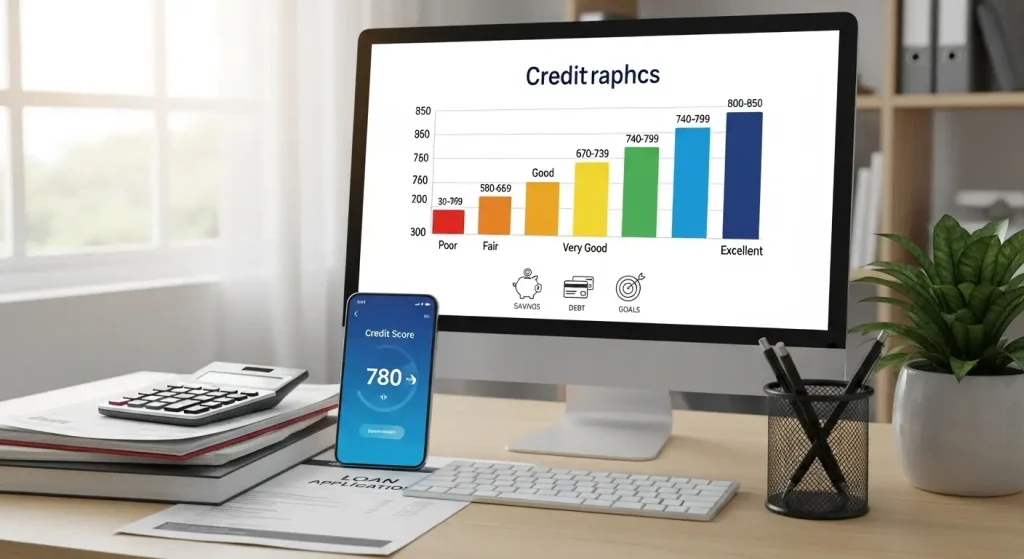Your credit score is one of the most important numbers in your financial life, yet many people don’t fully understand how it works or how to improve it effectively. Whether you’re looking to qualify for a mortgage, get better interest rates, or simply achieve financial peace of mind, learning how to improve credit score quickly can save you thousands of dollars over your lifetime.
Recent studies show that consumers are increasingly searching for immediate solutions, with queries like “how can I fix my credit score fast?” becoming more common, indicating a growing awareness of credit’s impact on financial opportunities.
How to Start a Gratitude Journal and Stick to It
Understanding Credit Scores: The Foundation of Financial Health
Credit scores range from 300 to 850, with higher scores indicating better creditworthiness to lenders. These three-digit numbers represent your credit risk and determine your ability to secure loans, credit cards, and even housing rentals.
Credit Score Ranges Explained
Excellent Credit (740-850):
- Access to best interest rates and loan terms
- Premium credit card offers with rewards
- Easier approval for mortgages and auto loans
- Lower insurance premiums in some states
Good Credit (670-739):
- Competitive interest rates on most loans
- Access to standard credit cards and financing
- Generally favorable lending terms
Fair Credit (580-669):
- Higher interest rates on loans and credit cards
- May require security deposits or co-signers
- Limited credit card options
Poor Credit (300-579):
- Difficulty qualifying for traditional credit
- High interest rates when credit is available
- May need secured credit cards or alternative lending
Mindfulness Techniques for Reducing Everyday Stress
The 5 Key Factors That Determine Your Credit Score
Understanding what impacts your credit score is crucial for effective credit score improvement. Here are the weighted factors that credit bureaus use:
1. Payment History (35% of Your Score)
Your track record of making payments on time is the most significant factor in how to improve credit score calculations. Even one missed payment can negatively impact your score for months.
2. Credit Utilization (30% of Your Score)
This measures how much credit you’re using compared to your available limits. Keeping utilization below 30% is good, but below 10% is ideal for boost credit score efforts.
3. Length of Credit History (15% of Your Score)
The average age of your credit accounts affects your score. Keeping older accounts open, even if unused, can help with credit score improvement.
4. Credit Mix (10% of Your Score)
Having different types of credit (credit cards, auto loans, mortgages) demonstrates your ability to manage various forms of debt responsibly.
5. New Credit Inquiries (10% of Your Score)
Too many hard inquiries in a short period can lower your score. Space out credit applications when possible.
Houseplants That Thrive Indoors: A Beginner’s Guide
How to Improve Credit Score: 7 Proven Strategies
1. Pay All Bills on Time, Every Time
The most effective way to improve credit score is maintaining perfect payment history. Set up automatic payments for at least the minimum amount due to ensure you never miss a payment.
Quick Implementation Tips:
- Use calendar reminders for due dates
- Set up autopay for all credit accounts
- Pay bills as soon as you receive them
- Consider paying twice monthly to improve utilization ratios
2. Reduce Credit Utilization Immediately
One of the fastest ways to boost credit score is lowering your credit utilization ratio across all accounts.
Strategic Approaches:
- Pay down existing balances before statement dates
- Request credit limit increases on existing cards
- Distribute balances across multiple cards
- Make multiple payments per month
3. Keep Old Credit Accounts Open
Length of credit history contributes significantly to credit score improvement. Closing old accounts can actually hurt your score by reducing your average account age and available credit.
4. Become an Authorized User
Ask a family member with excellent credit to add you as an authorized user on their account. This strategy can provide immediate credit score improvement by adding positive payment history to your report.
5. Dispute Credit Report Errors
Credit report errors are surprisingly common and can significantly impact your credit scores. Regular monitoring and disputing inaccuracies is essential for maintaining optimal scores.
Common Errors to Look For:
- Incorrect personal information
- Accounts that don’t belong to you
- Wrong payment history or account status
- Duplicate accounts or debts
- Outdated negative information
6. Consider Credit Builder Loans
Credit builder loans are specifically designed to help people improve credit score by establishing positive payment history. These loans hold your money in an account while you make payments, then release the funds once paid off.
7. Use Secured Credit Cards Strategically
If you have poor credit or no credit history, secured credit cards offer a pathway to credit score improvement. Use them responsibly by keeping balances low and paying in full each month.
Essential Travel Tips for First-Time Solo Travelers: Your Complete Guide to Safe and Memorable Adventures
Quick Credit Score Improvement: 30-60-90 Day Plan
30-Day Actions for Immediate Impact
Week 1-2:
- Check all three credit reports for errors
- Pay down credit card balances to below 30% utilization
- Set up automatic payments for all accounts
Week 3-4:
- Dispute any errors found on credit reports
- Request credit limit increases from existing card issuers
- Pay off small balances completely
60-Day Strategic Improvements
- Become an authorized user on family member’s account
- Apply for a credit builder loan if needed
- Negotiate payment plans for any past-due accounts
- Continue paying down high-utilization accounts
90-Day Long-Term Foundation Building
- Establish consistent payment patterns across all accounts
- Monitor credit score changes and adjust strategies
- Consider opening a new credit account if utilization is consistently low
- Build emergency fund to prevent future credit issues
How to Create a Personal Budget and Save Money
Advanced Strategies to Boost Credit Score
The 15/3 Payment Method
Make one payment 15 days before your statement date and another 3 days before. This keeps your utilization extremely low when your balance is reported to credit bureaus.
Goodwill Letters for Past Mistakes
Write goodwill letters to creditors asking them to remove negative marks as a courtesy, especially if you’ve been a good customer since the incident.
Credit Mix Optimization
Strategically diversify your credit types by adding an installment loan (auto, personal, or credit builder loan) to complement existing credit cards.
Common Credit Score Improvement Mistakes to Avoid
Closing Old Credit Cards
Many people mistakenly close old credit cards, which can hurt their credit scores by reducing available credit and shortening credit history length.
Applying for Too Much Credit at Once
Multiple hard inquiries in a short period can significantly impact your ability to improve credit score. Space applications at least 6 months apart when possible.
Ignoring Small Balances
Small balances on multiple cards can still hurt your utilization ratio. Focus on paying off smaller balances first for quick credit score improvement.
Not Monitoring Progress
Regular credit monitoring is essential for tracking how to improve credit score efforts and catching new issues early.
7 Daily Habits for a More Productive Morning Routine
FAQ Section
How fast can you improve your credit score?
You can see credit score improvement in as little as 30 days by paying down high balances and correcting errors on your credit report. However, significant improvements typically take 3-6 months of consistent positive behavior. The fastest ways to boost credit score include paying down credit card balances below 30% utilization, disputing credit report errors, and becoming an authorized user on someone else’s account with excellent payment history.
What credit score is considered good for getting approved for loans?
A good credit score typically starts at 670, but the best rates and terms usually require scores of 740 or higher. For mortgages, many lenders prefer scores of 620 or above, while auto loans may be available with scores as low as 580. However, improving credit score to 740+ can save thousands in interest charges over the life of a loan and provide access to premium financial products.
Can paying off debt hurt your credit score?
Paying off debt generally helps improve credit score, but closing accounts after paying them off can sometimes cause temporary score decreases. When you pay off credit cards, keep the accounts open to maintain your credit utilization ratio and credit history length. For installment loans like auto or personal loans, paying them off typically provides positive credit score improvement by reducing your debt-to-income ratio and demonstrating responsible credit management.
How many points can your credit score increase in one month?
Credit score improvement of 20-50 points in one month is possible with aggressive strategies like paying down high balances, correcting major errors, or being added as an authorized user. However, typical monthly improvements range from 5-15 points with consistent positive behaviors. The key factors that can boost credit score quickly include reducing credit utilization below 10%, having errors removed from your report, and maintaining perfect payment history.
Should I use credit repair companies to improve my credit score?
While credit repair companies can be helpful, anything they can do legally, you can do yourself for free. These companies typically focus on disputing errors and negotiating with creditors, which are services you can perform independently. Focus on proven strategies to improve credit score like paying bills on time, reducing balances, and monitoring your credit report regularly. If you do choose a credit repair service, research thoroughly and avoid companies that make unrealistic promises about credit score improvement.
DIY Home Organization Hacks for Small Spaces
Take Control of Your Financial Future Today
Understanding credit scores and implementing proven credit score improvement strategies can transform your financial opportunities and save you thousands of dollars in interest charges. The key to success lies in consistency, patience, and focusing on the factors that have the greatest impact on your score.
Remember that how to improve credit score effectively requires a long-term commitment to responsible credit management. Start with the quick wins like paying down balances and disputing errors, then build sustainable habits that will keep your score high for years to come.
Ready to accelerate your credit improvement journey? Check out our recommended credit monitoring tools and secured credit cards designed to help you boost credit score faster and more effectively:










